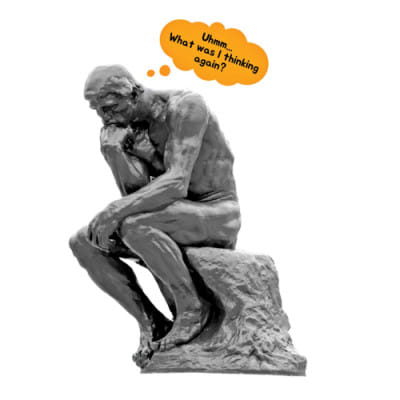Mental Muscles and Digital Dilemma

Ancient Greek philosopher Plato had an unusual apprehension of writing. He famously connoted "written" with "forgotten": "if people learn this, it will implant forgetfulness in their souls".
Being someone who has grown up religiously believing that writing once is better than reading thrice, this fear of written words puzzled me. Doesn't advancement in writing lead to an advancement in thinking?
According to Plato, however, resorting to writing meant depending on an external source and not exercising the memory. Turns out this premonition continues to exist but on a much larger scale. Neuroscientist Manfred Spitzer coined the term "digital dementia," explaining how extensive use of technology, especially the internet, is gradually leading to a breakdown of cognitive abilities. Idle memory muscles are foreboding to the intellectuality of our species.
When was the last time you mentally split the bill during a hangout? How many times do you check your phone to confirm a location? This reliance on phones and other devices for information we could otherwise retrieve from memory deteriorates short-term memory pathways.
In other words, information that can be instantly accessed is immediately forgotten. This happens because the neural pathways aren't trodden enough to create permanent memories. As a result, we end up losing and, in some cases, failing to develop cognitive skills like arithmetic and location mapping.
Recalling memories strengthens them, and at the same time allows the brain to get rid of the distracting short-term memories. This mechanism saves energy for more recent and relevant tasks and enables the building of cognitive skills. Nonetheless, over-reliance on technology has hampered this to an extent that we need to consult our phones for the very last thing seen. The implications may be grave. Ever moved from one room to the other only to realise that you forgot why you came? Looks like short-term memory is getting shorter.
While the human brain is great at storing information, it is even better at recognising patterns and making deductions. Outsourcing certain tasks like the memorisation of phone numbers to devices can save cognitive resources for more important things like decision-making. This may also look like using digital or physical notepads for brain dumps so that one is mentally free to focus on the task at hand reducing the anxiety of multi-tasking that life in the 21st century has brought about.
At the end of the day, it is about making a conscious decision of when I should rely on a device and when on memory.
Looking back at Plato's quote, it's still hard to believe. Partly because modern science has proved how writing aids memory by bolstering neural networks, and partly because the complexity of and accessibility to information now is no match to that of ancient Greece. Yet the reason provided is quite in line with contemporary research. In the light of these findings, memory expert and coach Jim Kwik remarks, "There is a price for lazy mental muscles, use it or lose it.'' Perhaps the only resources in the world which decrease when unused and increase when used are cognitive resources. Hopefully, we can make dedicated decisions for the latter.
Riyana is an introvert self-debating on whether she is an INFJ or INFP. Send her memes on introversion and MBTI personality tests on Instagram at _raya_riyana_

 For all latest news, follow The Daily Star's Google News channel.
For all latest news, follow The Daily Star's Google News channel. 



Comments